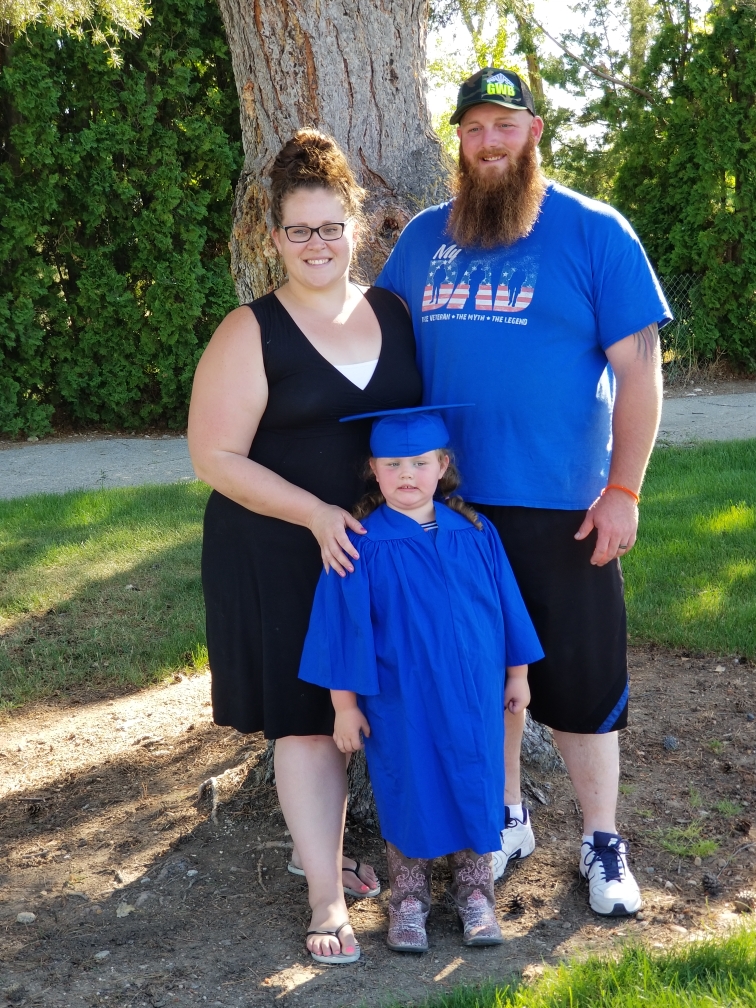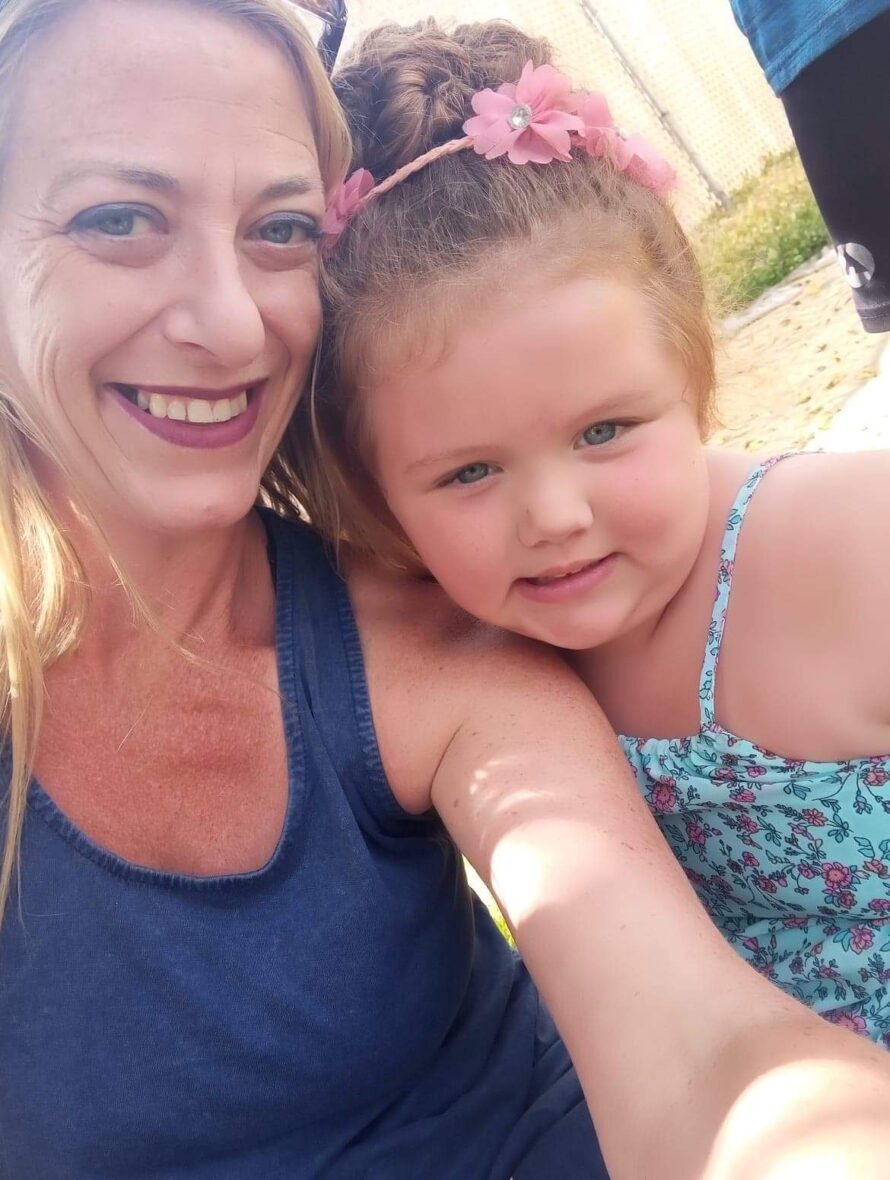“A-E-I-O-yoUUUUUUU,” four-year-old Aubrey Todd sang one day after preschool, howling for emphasis on the “U.”
An ecstatic Morgan Todd whipped out her phone.
“Oh my gosh, my child just sang her vowels to me,” she wrote in a text to Aubrey’s teacher.
Aubrey’s song was an unexpected surprise for her mother, only weeks into the girl’s first semester of a grant-funded preschool program called “Get Ready to Learn! Kuna.” By the time she graduated from preschool this spring, Aubrey could spell her name, sound out letters and recognize words — even if she didn’t quite know what they said.
“She’ll ask me, ‘What does M-O-M spell?'” Morgan Todd said, “and I can tell her it spells ‘mom.'”

Get Ready to Learn! Kuna was one of 15 grassroots preschool collaboratives that would have benefited from a $6 million-a-year federal Preschool Development Grant allocated by Idaho Association for the Education of Young Children. But during the 2021 session, conservative lawmakers refused to authorize spending the grant money, saying the national chapter of the Association for the Education of Young Children was trying to push a liberal agenda on preschool aged children. Idaho AEYC executive director Beth Oppenheimer calls the claim false.
Coming into this year, pre-k planners were looking to use the grants to expand local programs. Without the money, some expansion plans have been put on hold as collaboratives scramble to cobble together funding alternatives to keep their dreams, and momentum, alive.
Oppenheimer likened it to trying to fly a plane without a wing.
“The (Preschool Development Grant) renewal was really helping build that plane before it took off,” she said.
The Kuna collaborative graduated 16 kids from its bilingual preschool this spring, including English language learners, children from migrant families and low-income families. Organizers were hoping to add a second location this fall — but after the Legislature turned down the grant, director Ludee Vermaas wasn’t even sure she’d be able to offer the same 16 seats she’d already established.
After months of phone calls and grant applications, Vermaas has found enough funding to offer up to 14 seats next year, thanks to funding from the St. Luke’s health care system and Cap Ed Credit union. Expansion plans are still on hold, unless Vermaas can secure grants to fund more seats, and she’s still trying to fundraise money to continue the parent training program that the Preschool Development Grant was supposed to fund for three years.
“We’re moving forward despite the barriers that have been thrown our way,” Vermaas said.
Research shows that pre-kindergarten programs have a significant impact on kids’ ability to succeed in early grades, and long-term studies indicate early learning can continue to shape adult outcomes such as college attendance and employment. Idaho remains one of only four states that don’t fund preschool. According to an Idaho AEYC needs assessment, nearly 50% of Idahoans live in communities with either no early childhood options or a severe shortage of spots. Where spots are available, they can cost a prohibitive amount — child care for two kids, like an infant and a 4-year-old, costs nearly $14,000 a year, the study found.
To help address some of those needs, Idaho AEYC helped develop or expand the 15 early learning collaboratives, community partnerships that offer early education to help kids get ready for kindergarten.
The Preschool Development Grant is one of many grants that the Idaho AEYC has used to support the collaboratives. Awarded for the first time in 2019, a $3 million federal Preschool Development Grant funded an unprecedented statewide needs analysis of early learning, and allowed the local collaboratives to build governance structures, conduct local needs assessments and make plans to address those needs.
The new $6 million Preschool Development Grant renewal, the one the Legislature tabled, would have helped the collaboratives carry out those plans.
“These dollars were going to help directly and indirectly support the movement these local communities have made,” Oppenheimer said.
At this point, it’s unlikely Idaho can benefit from the first year of the grant funding. Legislative inaction basically tied the grant money up in red-tape. However, Oppenheimer said she’s been talking with the federal government about whether Idaho could still tap into years two and three of the grant.
“They’re kind of in a conundrum because they’ve never done this before. They’ve never had a state that’s put this much time, energy and money into applying for a fairly significant federal grant, to turn around and turn it away,” she said. “They’re kind of working on their end. They want Idaho to be successful.”

Jen Wright, the elementary principal in the Notus School District, dreams of an early learning center between Notus and Parma. With help of the first Preschool Development Grant, Wright and a team of parents, special education directors and school administrators gathered to start working on that “pipe dream,” and other ways to expand local early learning options, such as expanding Head Start into the towns.
She’s hoping that the group will keep working on that collaboration, even without guaranteed grant support.
“I know there’s still a need and an interest and a passion,” Wright said. “It felt like we had huge momentum.”
Notus partners with a local daycare, Roni’s House, to offer 12 preschool seats at Treasures Playschool. The program was tuition-free this year. Next year, Wright said, the collaborative might ask parents to pay what they can.
“We don’t want to turn anyone away,” she said.
Tryston Bugher’s son, Westly, took part in that collaborative last year. He’s Bugher’s third child, and the first to have the option for preschool through the Treasures collaborative. Her oldest two attended a private preschool in Middleton for a couple of days each week, at a cost of about $150 a month.
If she could have, Bugher said, she would have sent all of her kids to Treasures: It was easier on the bank, close to home, and Westly spent more time at Pre-K than his sisters were able to.
Bugher’s main goal in enrolling her oldest daughter for preschool was emotional. “I wanted her to know she’d be OK with other people,” Bugher said. But she saw the academic impacts right away. Today, her eldest is nine and is an avid reader, a habit Bugher credits to preschool.
Westly, who finished preschool this spring, knows his shapes and the alphabet, and has a newfound sense of independence and focus. He’s more task-oriented for one, finishing more of the projects that he starts. And while he’s always asked to help his mom make eggs, he now insists that he can cook his own.
“We’ll go to cook breakfast, and he’ll say, ‘I’m cooking breakfast,’” Bugher said. “He doesn’t know the heat settings, so he can’t really do it himself, but he sure thinks he can.”
As the parent of a preschooler in an AEYC-supported collaborative, Bugher said she was shocked to hear that legislators had derailed the grant over concerns around liberal indoctrination. She says she never worried that pre-k advanced a political agenda, and says her child has only picked up basic academic knowledge.
“That’s just sad for those kids that might miss out,” she said.
